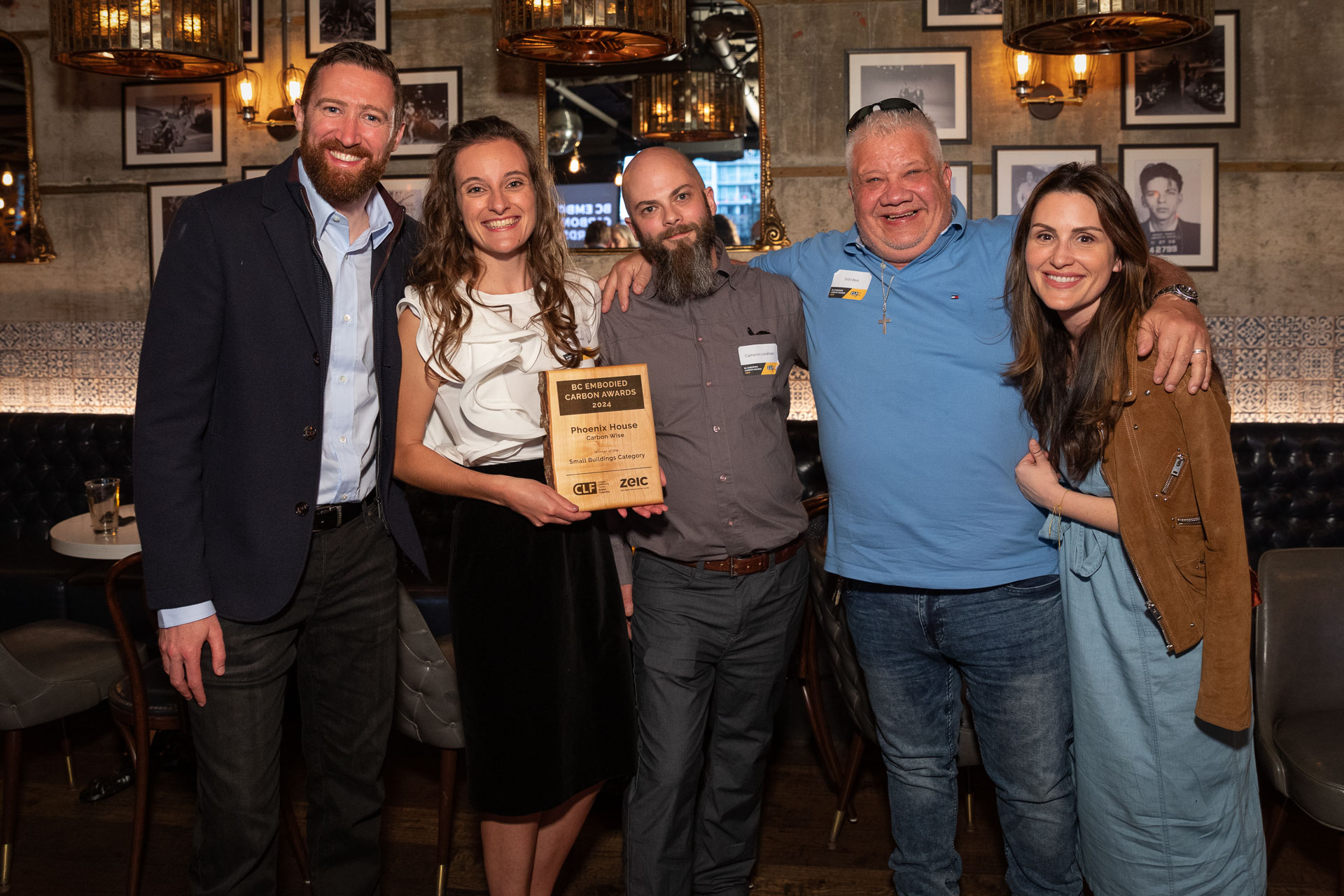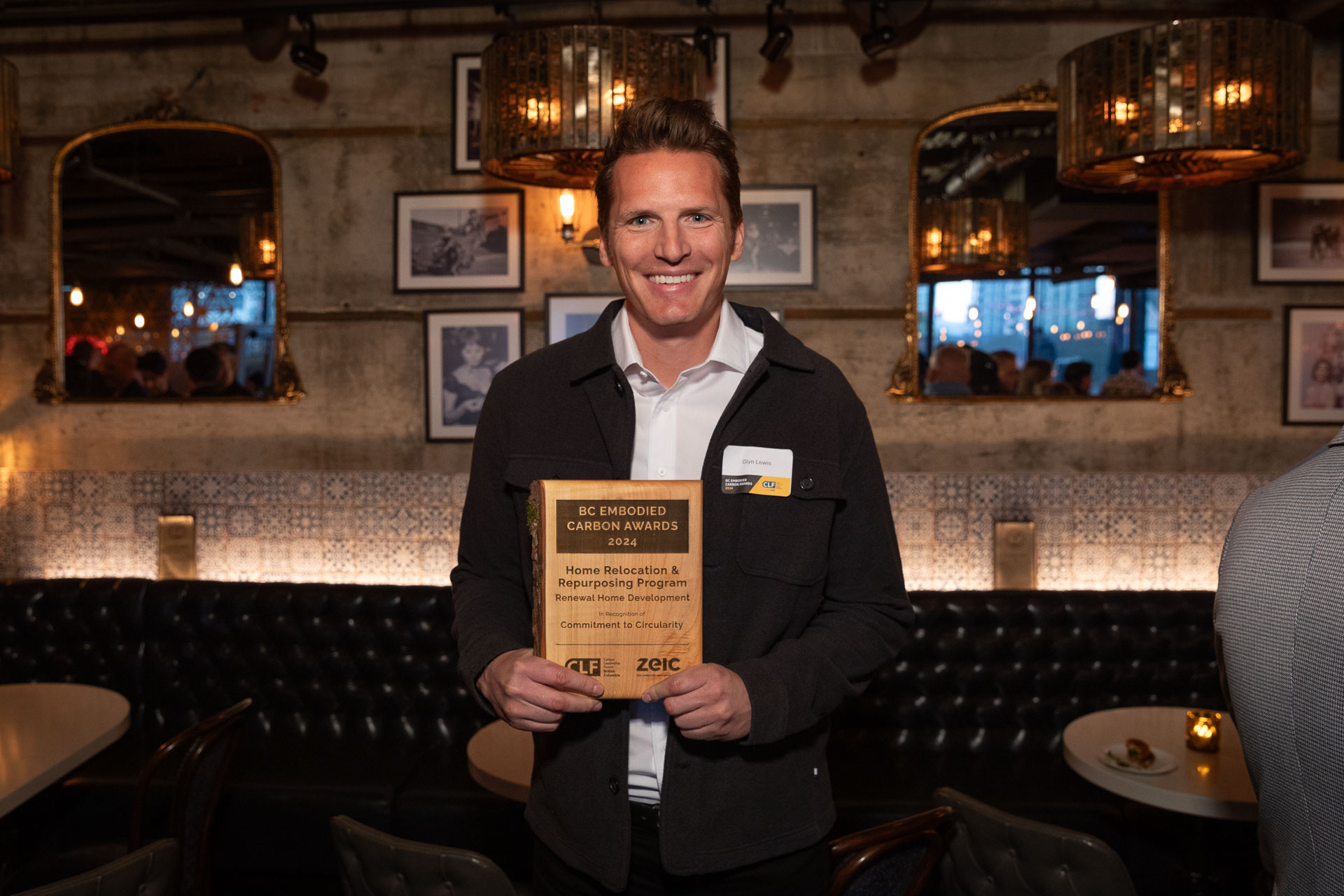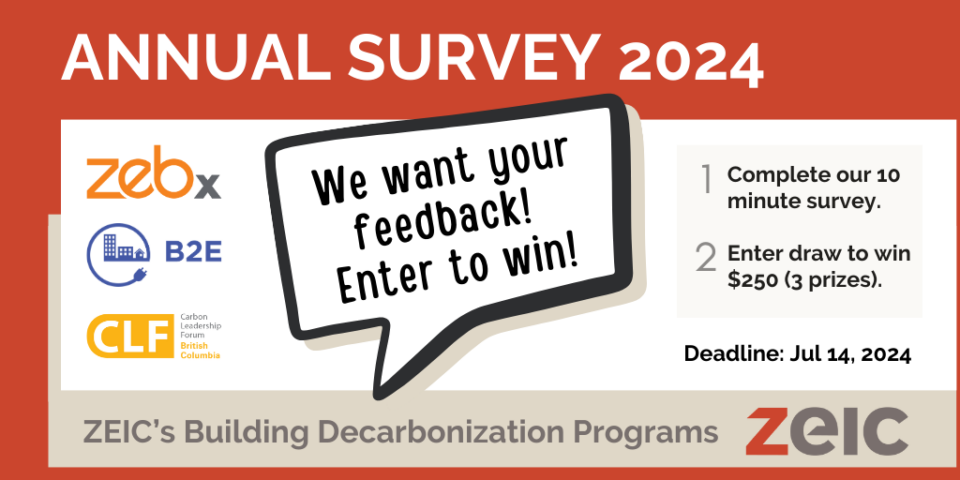
Newsletters: Latest Edition plus 2024 Issues
February 22, 2024
Building Decarbonization Programs: Annual Survey 2024
June 27, 2024BC Embodied Carbon Awards Recognize Excellence in Climate-Friendly Building Design
Much of a building’s carbon pollution is locked up in its concrete, steel, and other constituent materials. These awards recognize those working to reduce it.
Press Release / Apr 23, 2024 – For Immediate Release
COAST SALISH TERRITORIES I VANCOUVER, BC — This past week, members of British Columbia’s zero-carbon buildings community came together to recognize six individuals, projects, and organizations for their leadership on reducing embodied carbon pollution in the province.
Embodied carbon emissions are those produced during the production and transportation of building materials such as steel, concrete, insulation, and glass, during construction, and those produced when a building is taken apart or demolished at the end of its life.
The Zero Emissions Innovation Centre (ZEIC), through its Carbon Leadership Forum British Columbia (CLF British Columbia) program, hosted the second annual BC Embodied Carbon Awards in downtown Vancouver on April 18, 2024. The awards, the first of their kind in North America, aim to showcase and celebrate leadership and inspire others to reduce embodied carbon in their projects.
Funding and Sponsors
The BC Embodied Carbon Awards were made possible through program funding from the Zero Emissions Innovation Centre and City of Vancouver and event sponsors RJC Engineers (Gold), Perkins & Will, hcma, Third Space, and CLF Toronto (Silver), and reLoad Sustainable Design, Carbon Wise, and Equilibrium (Bronze).
Winners - (Photos Below)
Judges for each of the six categories handed out the awards before a capacity crowd of 130 people at the Ventura Room in downtown Vancouver. All of the judges are members of the CLF British Columbia Volunteer Group.
Organizational Commitment to Change: ZGF Architects
This award recognizes a company or organization that has shown exemplary leadership in reducing embodied carbon in British Columbia’s built environment.
Public Sector Leadership: University of British Columbia
This award recognizes a British Columbia-based local government, public sector organization, or non-profit organization that has demonstrated exemplary leadership in reducing embodied carbon in British Columbia’s built environment.
Strengthening the Practice: Anthony Pak
This award recognizes a building sector professional who has demonstrated an exemplary commitment to reducing embodied carbon across British Columbia’s built environment. Note: This is a nomination-based award.
Large (Part 3) Buildings: North Island College Student Housing, HDR Architecture
This award recognizes a large new development or a substantial renovation of a large building that demonstrates excellence in low-embodied-carbon design and construction . The relevant local government or permitting authority must classify the recognized building(s) under Part 3 of the building code.
Small (Part 9) Buildings: Phoenix House, Carbon Wise
This award category recognizes excellence in low-embodied-carbon design in a small new project such as a single-family home or laneway home, or a substantial renovation of an existing single-family home or smaller building. The relevant local government or permitting authority must classify the recognized building(s) under Part 9 of the building code.
Commitment to Circularity: Renewal Development
This award recognizes exceptional initiatives and projects that embrace and tangibly advance circularity or circular concepts within British Columbia’s buildings sector.
Quotes
Lisa Dominato, Councillor, City of Vancouver and Chair, Climate Action Committee, Metro Vancouver:
“As all levels of government look to accelerate the delivery of housing, it becomes even more critical to consider the carbon impacts of more high-rise buildings and greater use of high-carbon materials such as conventional concrete. These award-winning projects and organizations have shown us that addressing embodied emissions through the lifecycle of a building is an essential, strategic, and cost-effective way to reduce emissions while creating new housing and commercial space, local and regional economic development, and jobs. We are grateful to the Zero Emissions Innovation Centre and its Carbon Leadership Forum British Columbia program for their work to bring together and strengthen the diverse community of practitioners leading the way on climate action within the building sector in Vancouver and BC.”
Melina Scholefield, ZEIC Executive Director:
“These awards demonstrate leadership and climate actions that are much needed and achievable today as we work towards 2030 emissions reduction targets. We are pleased to be celebrating those who are committed to accelerating the effort to reduce embodied emissions in this province’s building sector. These winners are proving that our climate goals are achievable when we collaborate and prioritize sustainability in our buildings.”
Roberto Pecora, ZEIC Director of Building Decarbonization:
“The embodied carbon related to the construction and renovation of buildings is a major contributor to BC’s carbon footprint. Although it’s not the focus of emissions-reducing building regulations except for the City of Vancouver, the BC building industry is stepping up with some outstanding initiatives. These deserve acknowledgement, and so do the people and organizations that lead them. The CLF BC Awards are our way of giving industry and governments a round of applause.”
Stephanie Dalo, CLF BC, Program Manager, ZEIC:
“Reducing embodied carbon of buildings requires collaboration, innovation, effort, and a real commitment. This means stepping outside of the box and approaching design and construction in a new way. While that’s not always easy, The winners of the Embodied Carbon Awards are demonstrating that this can be done! We are pleased to be able to recognize and celebrate the leaders in our industry who are paving the way to net zero.”
The Carbon Leadership Forum (CLF) British Columbia is a program of the Zero Emissions Innovation Centre (ZEIC)—an independent nonprofit and charitable organization that is part of the Low Carbon Cities Canada network established by the Government of Canada and the Federation of Canadian Municipalities. Since its creation in 2019, CLF British Columbia has played a key role in the City of Vancouver’s efforts to significantly reduce embodied carbon in buildings and has supported industry and local governments across British Columbia. The CLF BC program area is supported through funding from the City of Vancouver and the North Family Foundation. In recent years, Forestry Innovation Investment has also been a key supporter of education, training and capacity building initiatives through CLF British Columbia
Contact:
Gordon Patrick Newell - Manager, Communications, ZEIC
info@zeic.ca | zeic.ca | clfbritishcolumbia.com
604-330-2017
Photographs
All photos must be credited to Dan Kirchner @360hometours.ca

Organizational Commitment to Change: ZGF Architects

Public Sector Leadership: University of British Columbia

Strengthening the Practice: Anthony Pak.

Large (Part 3) Buildings: North Island College Student Housing, HDR Architecture

Small (Part 9) Buildings: Phoenix House, Carbon Wise

Commitment to Circularity: Renewal Development
Backgrounder: About Embodied Carbon Emissions
- Embodied carbon emissions are those produced during the production and transportation of a given building’s constituent materials—such as steel, concrete, and glass—and those produced when a building is taken apart or demolished at the end of its life.
- To date, British Columbia’s local and provincial governments have placed a stronger climate policy emphasis on buildings-sector operational emissions—those produced by fossil fuels, such as natural gas, when they are burned to produce space and water heating.
- Though embodied emissions have received relatively less attention from governments, they are a significant contributor to the buildings sector’s overall carbon footprint.
- Policy and regulation context:
- The City of Vancouver has a goal to reduce the embodied emissions from new buildings by 40 per cent below 2018 levels. With the launch of its Embodied Carbon Guidelines and its 2023 update to the Vancouver Building By-law, the City has established a compliance framework and an upper limit for embodied carbon.
- The Province of British Columbia is part of the Pacific Coast Collaborative (PCC), an initiative with Washington, Oregon, and California. The PCC launched a Low Carbon Construction Task Force in November 2021. It seeks to accelerate innovation, investment, and market development for low carbon materials by leveraging the scale of the Pacific Coast regional economy, one of the largest in the world.
- Under its Policy on Green Procurement, the Government of Canada requires the disclosure of—and a 10% reduction in—the embodied carbon footprint of structural materials, starting with ready-mix concrete, used in major government projects. The requirement applies to projects valued at $10+ million and that will be expected to use more than 100 cubic meters of concrete.





